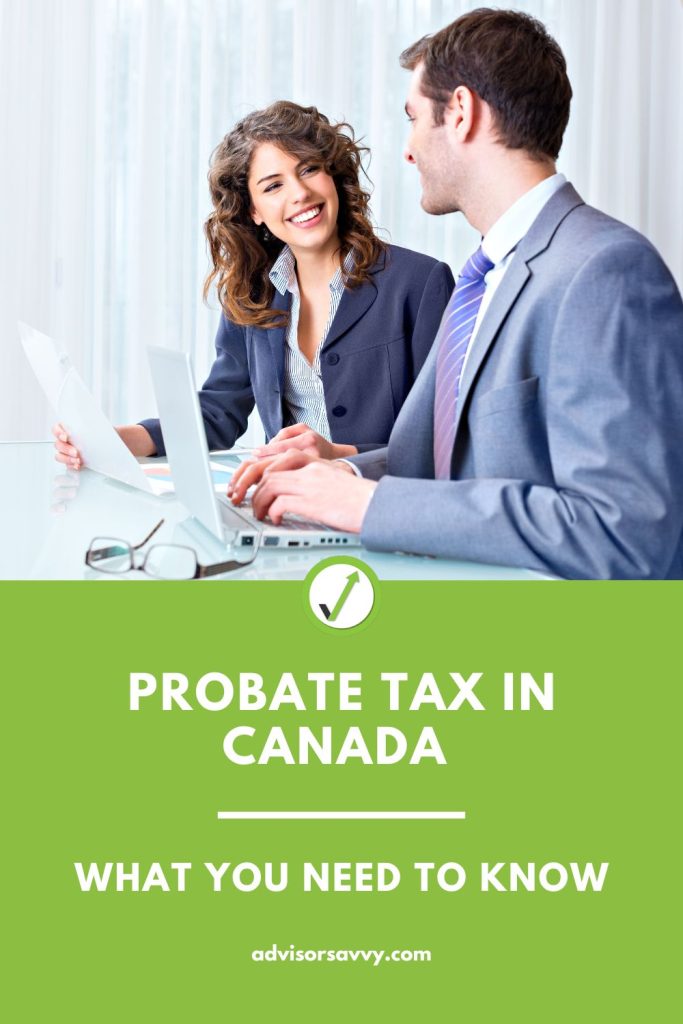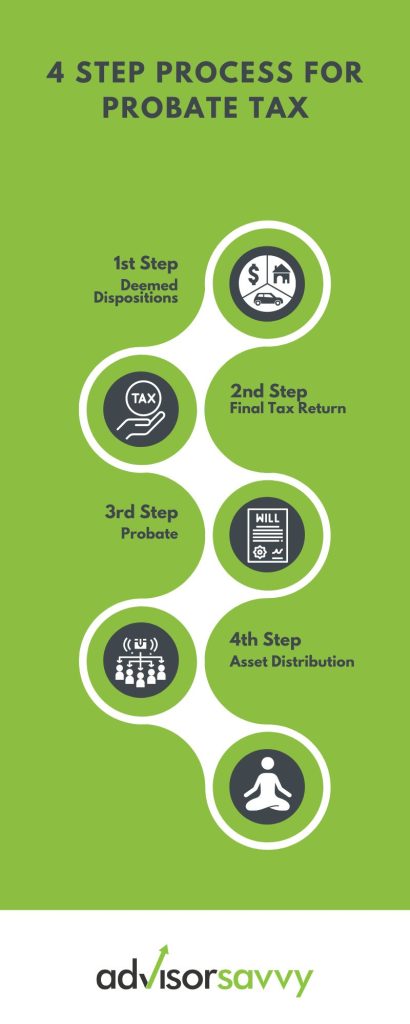
If you’re in the process of writing a will or planning your estate, you might have come across the term probate. But what is it and how much is probate tax in Canada? Considering probate fees is definitely a part of estate planning, so you’ve come to the right place! In this guide, we’ll explore all the details of probate, how the process works and how much you can expect to pay. In addition, we’ll cover how to reduce and avoid probate.

Table of contents
What is the Probate Tax in Canada?
First, let’s discuss what probate is. In Canada, probate is the administration process of verifying someone’s will or final wishes upon their death. More specifically, probate is a legal approval process which validates a will and confirms an executor’s appointment. This includes reviewing the will for authenticity and legitimacy before distributing the assets accordingly. These activities are usually carried out by an executor. Often, the executor is named in the will.
Probate tax or fees is the cost of going through the probate process. It is also commonly referred to as estate administration tax. The cost of probate is taken from the estate before it’s distributed to the beneficiaries. There is no inheritance tax in Canada. In other words, all taxes and fees are handled within the estate, then passed on to the beneficiaries tax-free.
Is there probate tax in Canada?
Yes, probate tax applies in Canada. The amount of probate tax you pay is usually a percentage of the estate’s total dollar value. But what exactly is an estate? An estate is the total financial, quantitative value of an individual’s assets, investments, belongings, real estate, and interests. The exact percentage of probate tax applied to an estate’s value varies by province and territory. We’ll cover the applicable rates in each province and territory later on in this article.
Related Reading: Estate Taxes in Canada

The Probate Process in Canada
When someone passes away, the basic probate process is as follows:
- Step 1: Deemed Dispositions. At the time of death, any owned assets are deemed to be disposed of by the deceased. In other words, the deceased “sold” all their assets and they will report capital gains (or losses) and pay tax on those amounts.
- Step 2: Final Tax Return. The executor or legal representative completes and files the final tax return on behalf of the deceased. Any owed taxes are taken out of the estate, including capital gains tax as described in step 1. If the deceased died between January 1 and October 31, the final return is due by April 30 in the following year. If the deceased passed between November 1 and December 31, the final return is due 6 months after the date of death.
- Step 3: Probate. Once final taxes have been filed and paid, the assets can be distributed according to the will. But before that can happen, the will must be validated through the official legal probate process. The executor has to apply for probate in their province or territory.
- Step 4: Asset distribution. After the will is officiated through probate, the executor can distribute assets accordingly to beneficiaries.
The above process may seem simple, but remember that death can stir up problems. For instance, executors may no longer be able to serve and someone else has to be appointed. Or the will might be contested by family members or friends of the deceased. Overall, it normally takes a few months to go through the above process, but it can take longer if there are complications.
How much is probate tax in Canada?
Probate tax is usually a percentage of the total estate’s value. However, the rates and thresholds depend on the province or territory which the deceased resided in. Below is more information on probate tax by province and territory in Canada.
Probate tax rate in Canada
| Province/Territory | Probate Tax Rate |
| Ontario | – First $50,000 exempt from probate tax – 1.5% of the estate’s value over $50,000 |
| British Columbia | – First $25,000 exempt from probate tax – 1.6% of estate value between $25,000 and $50,000 – 1.4% for amounts above $50,000 |
| Alberta | – $35 for estate values of $10,000 or less – $135 for estate values between $10,000 and $25,000 – $275 for estate values between $25,000 and $125,000 – $400 for estate values between $125,000 and $250,000 – $525 for estate values over $250,000 |
| Manitoba | – $0 (eliminated on November 5, 2020) |
| Saskatchewan | – 0.7% of the estate’s value |
| New Brunswick | – $25 for estate values of $5,000 or less – $50 for estate values between $5,000 and $10,000 – $75 for estate values between $10,000 and $15,000 – $100 for estate values between $15,000 and $20,000 – 0.5% for estate values over $20,000 |
| Newfoundland and Labrador | – $60 for estate values of $1,000 or less – 0.6% on estate values over $1,000 |
| Prince Edward Island | – $50 for estate values of $10,000 or less – $100 for estate values between $10,000 and $25,000 – $200 for estate values between $25,000 and $50,000 – $400 for estate values between $50,000 and $100,000 – $400 for next $100,000 – 0.4% for estate values over $200,000 |
| Quebec | – $65 application fee |
| Nova Scotia | – $85.60 for estate values of $10,000 or less – $215.20 for estate values between $10,000 and $25,000 – $358.15 for estate values between $25,000 and $50,000 – $1,002.65 for estate values between $50,000 and $100,000 – $1,002.65 for next $100,000 – 1.695% for estate values over $200,000 |
| Nunavut | – $25 for estate values of $10,000 or less – $100 for estate values between $10,000 and $25,000 – $200 for estate values between $25,000 and $125,000 – $300 for estate values between $125,000 and $250,000 – $400 for estate values over $250,000 |
| Northwest Territories | – $30 for estate values of $10,000 or less – $110 for estate values between $10,000 and $25,000 – $215 for estate values between $25,000 and $125,000 – $325 for estate values between $125,000 and $250,000 – $435 for estate values over $250,000 |
| Yukon | – $140 filing fee for estate values over $25,000 – Filing fee may apply for estates under $25,000 in value |
Are probate fees tax deductible in Canada?
No, probate fees are not tax deductible. Unfortunately, other costs related to one’s death, such as funeral expenses or legal fees, are not tax deductible either. These are considered personal expenses which is why they aren’t deductible.
Related Reading: Are financial advisor fees tax deductible in Canada?
How can I avoid probate fees in Canada?
As we saw above, probate tax is dependent on the size of your estate in most provinces and territories. In other words, the lower your estate value is, the less probate you’ll have to pay. One way to avoid probate is to disperse your assets to beneficiaries while you’re still alive. In Canada, gifts and inheritances are tax free so your beneficiaries won’t have to pay additional tax. There are a few ways to distribute your estate before death, as follows:
- Joint ownership. You can put beneficiaries’ names on the title of the property or as a joint holder of a bank account. When you pass, the beneficiary will assume ownership of the account or asset which bypasses the probate process.
- Use a trust. A trust allows you to bypass the whole will and probate process. You can still distribute your estate to your beneficiaries according to your wishes through a trust.
- Cash gifts. You can gift cash to your beneficiaries before you die so that it’s not a part of your estate when you pass. Not only will this reduce or eliminate probate, your beneficiaries can probably make more use of it now and you can partake in the benefit!
Making Sense of Probate Taxes in Canada
Probate taxes in Canada are a part of estates, wills and, of course, death. While it can be unpleasant to think about, you do have control over what will happen to your wealth when you’re gone. By taking action today, you can reduce or eliminate the future probate tax of your estate.
Having trouble with your estate planning? We’ve got you covered! Find a financial advisor who can help you today.
